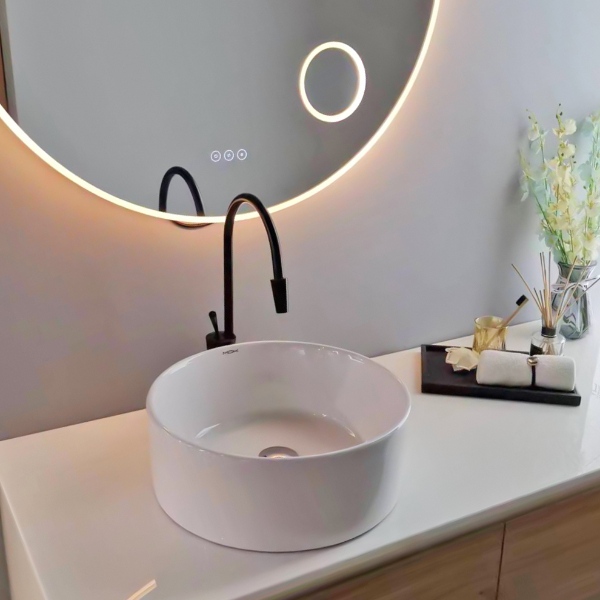
Solid Surface Bowls have gained popularity in various applications due to their sleek appearance, durability, and versatility. These bowls are made from a blend of acrylic or polyester resins combined with natural minerals, resulting in a non-porous, solid material with numerous benefits. Among these benefits are excellent heat and corrosion resistance, which make Solid Surface bowls a practical choice for both residential and commercial settings. This article explores the heat and corrosion resistance of Solid Surface bowls and highlights why these properties are significant.

Solid Surface Materials are known for their impressive temperature tolerance. Most solid surface bowls can withstand temperatures up to 80-85°C (176-185°F) without significant damage. This level of heat resistance makes them suitable for use in environments where exposure to hot items is common, such as in kitchens and laboratories.
While solid surface bowls offer good heat resistance, it is still advisable to avoid placing extremely hot objects directly on the surface. Prolonged exposure to high temperatures, such as placing a bowl near a stove or hot oven, could potentially affect the integrity of the material over time. However, for most everyday uses, such as holding warm or hot foods, solid surface bowls perform well without warping or discoloration.
Solid surface bowls generally have good heat insulation properties, meaning they do not conduct heat rapidly. This helps in preventing the transfer of heat from hot items to the surface of the bowl, reducing the risk of burns or damage. Additionally, the non-porous nature of solid surface material helps in maintaining the temperature of the contents inside the bowl, whether hot or cold.
One of the standout features of solid surface bowls is their resistance to chemicals. The material is highly resistant to common household acids, alkalis, and solvents, which means it does not easily corrode or degrade when exposed to acidic foods, cleaning agents, or other chemicals. This makes solid surface bowls an ideal choice for environments where chemical exposure is a concern, such as laboratories or commercial kitchens.
The non-porous nature of solid surface material plays a crucial role in its corrosion resistance. Unlike porous materials, solid surface bowls do not absorb liquids or chemicals, which prevents the material from breaking down or becoming weakened over time. This property also helps in maintaining the bowl’s appearance and hygiene, as there is no risk of staining or contamination from trapped substances.
Maintaining the corrosion resistance of solid surface bowls is relatively easy. Regular cleaning with mild soap and water is typically sufficient to keep the bowl in good condition. For more stubborn stains or residues, a gentle abrasive cleaner can be used without compromising the integrity of the material. This ease of maintenance ensures that solid surface bowls remain functional and visually appealing over time.
The combination of heat and corrosion resistance contributes significantly to the longevity and durability of solid surface bowls. These properties ensure that the bowls can withstand regular use in various environments without degrading. As a result, solid surface bowls offer long-term value and reliability, making them a cost-effective choice for both residential and commercial applications.
The non-porous surface of solid surface bowls, coupled with their resistance to heat and chemicals, promotes better hygiene and safety. There is no risk of bacterial growth or chemical reactions that could affect the contents of the bowl. This makes solid surface bowls a hygienic choice for food preparation and storage.
The heat and corrosion resistance of solid surface bowls expand their versatility of use. They are suitable for a wide range of applications, from kitchen bowls and serving dishes to laboratory equipment and decorative items. Their ability to maintain performance under various conditions makes them a versatile and practical option for different settings.
Solid surface bowls offer exceptional heat and corrosion resistance, making them a superior choice for many applications. Their ability to withstand high temperatures and resist chemical damage ensures that they remain functional and visually appealing over time. With their non-porous surface, ease of maintenance, and durability, solid surface bowls are a practical investment for both residential and commercial environments. By choosing solid surface bowls, individuals and businesses can benefit from a high-performance material that combines aesthetics with functional resilience.